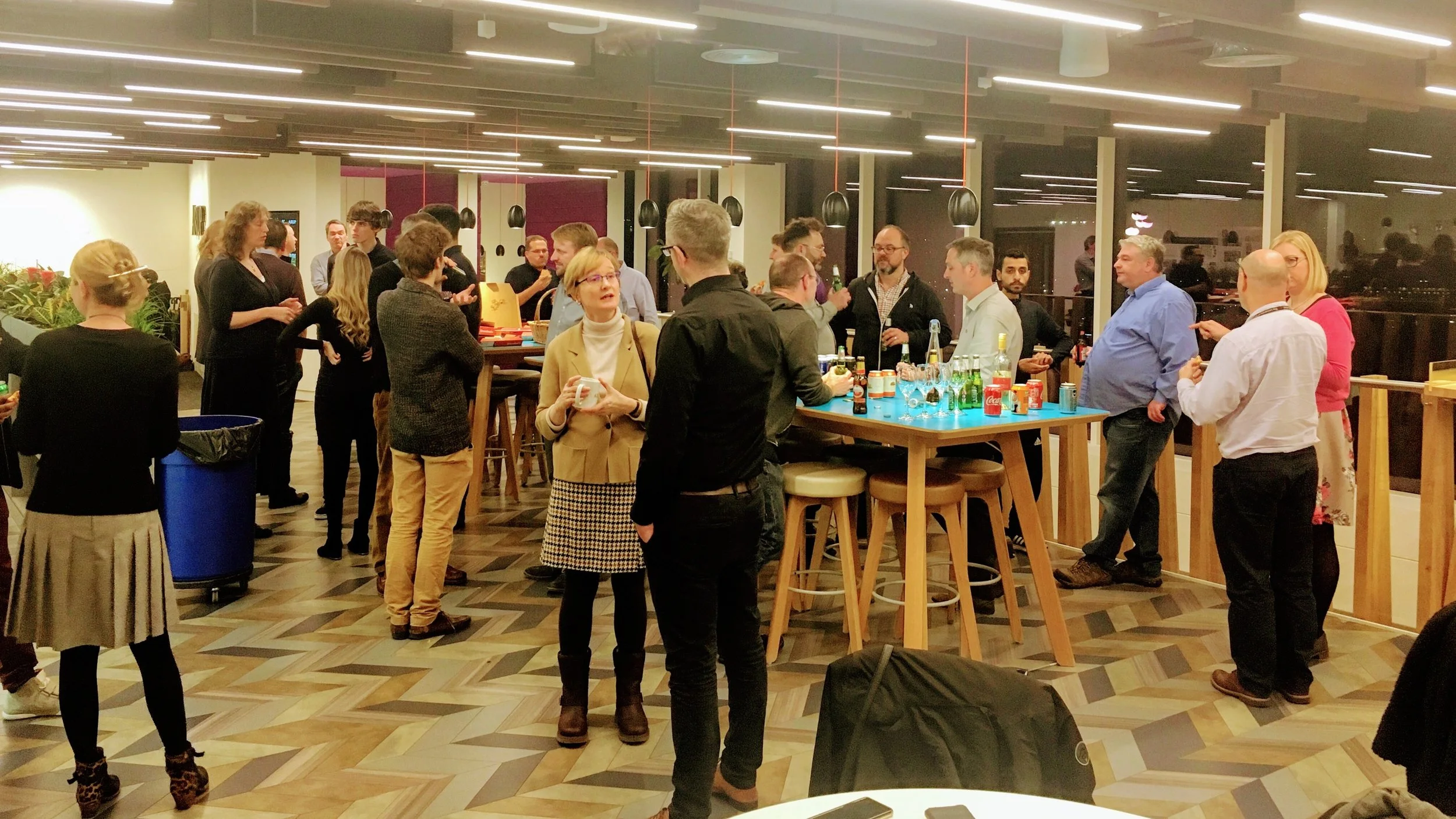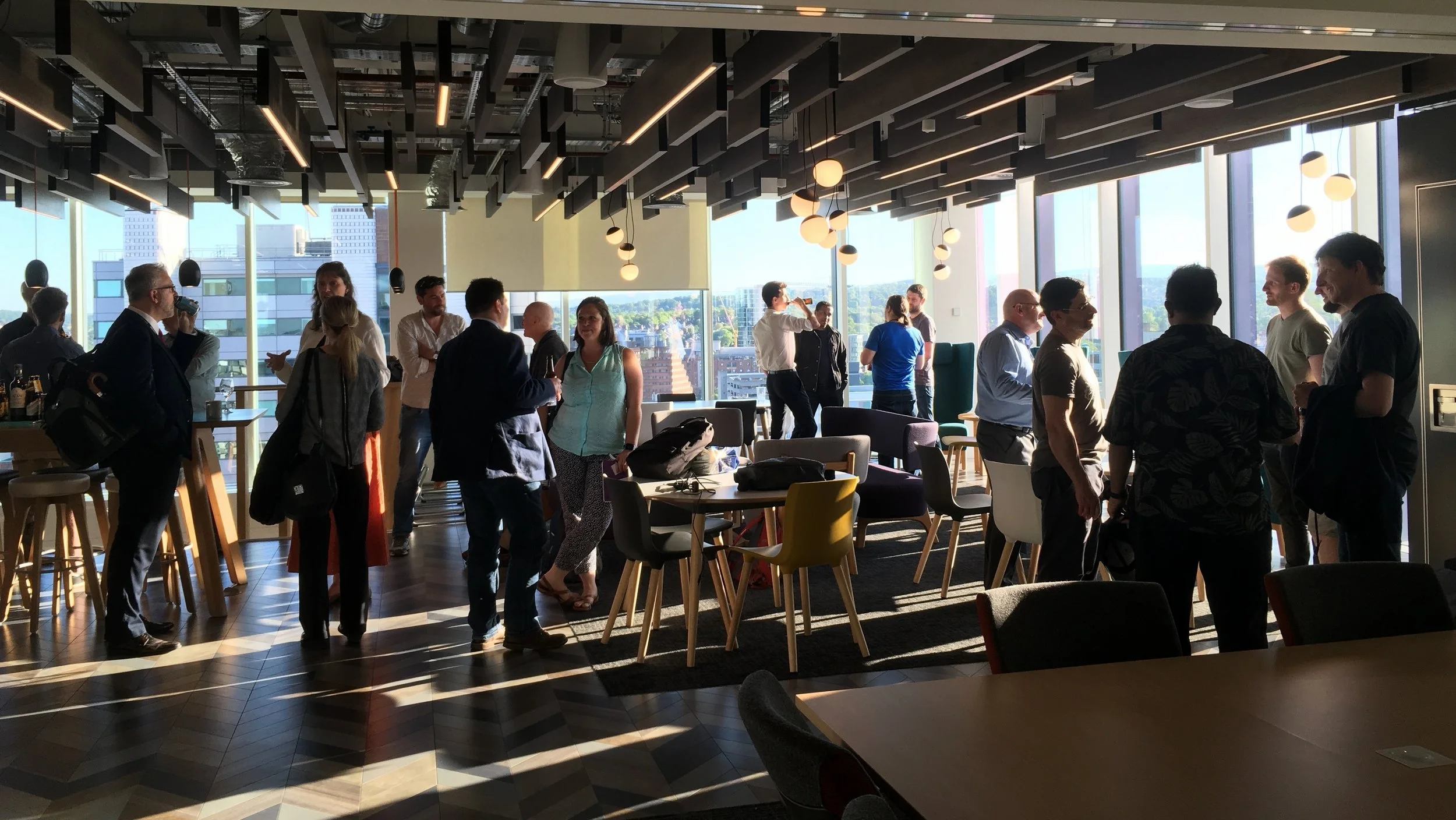Notes from Meetup #11: City Scale Systems
On Monday the 3rd September SmartSheffield returned from the Summer break to a full house, this time looking at city-wide infrastructure that forms an application stack on which developers and users can build new services and experiences.
We kicked off with Living PlanIT’s Urban Operating System, which is now available across Sheffield as part of their partnership with Westfield Health; then Ruckus’ city WiFi vision and what they are doing with their new access points; followed by SmartWorld Connect, who returned to explain how they are evolving their city app store platform; and Louis Pohl presented his vision for “Hours” - an application for measuring, tokenising and trading work carried out in the voluntary sector. So in combination we covered: sensing, connectivity, data management, application development and discovery, which then posed the question: is this the city technology stack we want?
Please get in touch if you have an opinion, or join the Sheffield Digital Slack community and pick up the conversation in the #SmartSheffield channel.
Here are the talks…
Dan Byles from Living PlanIT
Urban Operating Systems
Dan is Head of Corporate Development at Living PlanIT, and expressed great excitement at being part of what he described as “the whole tech revolution that’s starting to take place in Sheffield”.
Through their partnership with Westfield Health, Living PlanIT is making their Urban Operating System available to application developers and partners across the whole of Sheffield, free of change, and not just in areas of health and social care. They hope that doing this will encourage new applications and services to be built using its open standards-based infrastructure.
Living PlanIT are a relatively small tech company, founded ten years ago, and specialise in digital integration of the built environment, from buildings to districts to cities. The Urban Operating System (UOS) evolved from a system originally created to manage low latency, high volume telemetry data for Formula 1, and this technology still forms its core. The vision for the UOS goes further however, towards creating a platform where a broad range of city data can be made available through common interfaces and open standards and combined into new applications.
Dan presented a good overview of the challenges of urbanisation, technological disruption and the Smart City movement, and expressed his belief that:
“…there isn’t yet a smart city anywhere on the planet. There are cities that have narrow [proofs of concept], there are cities that are doing something interesting with parking here, or congestion over there, but the idea of creating a common data platform that enables you to gather data from a wide myriad of existing sources, bring it together and make it available through open standards and integrate it for people to use, for a vibrant 3rd party ecosystem to use and create value from still hasn’t happened anywhere. And when it does, and it could happen here in Sheffield, it’s going to be extremely powerful.”
This is the company’s vision for the Urban Operating System - a platform that enables a ‘triple bottom line’ by:
Improving economic outcomes by reduced costs and enabling new businesses.
Creating a more sustainable infrastructure, as it is integrated and put to more uses.
Providing better services and better experiences.
If you are interested in using Living PlanIT’s platform, let us know at info@smartsheffield.rocks and we’ll put you in touch :)
Kia Cottrell from Ruckus Networks
WiFi as a Platform for Smart Cities
Kia is Business Development Manager for EMEA at Ruckus Networks, who, since their acquisition by Arris, are engaged in translating the home WiFi experience into the outside world.
In this talk she explains why WiFi is a great platform for Smart City applications and how they are using WiFi to deliver more than just connectivity, for example in the LinkNYC smart kiosks in New York; in conjunction with Google’s “Station Project” where train stations in India, Indonesia and Mexico have been kitted out to provide WiFi access to the public; and via connected signage and other urban applications.
Ruckus’ WiFi Access Points (APs) can now be discretely hidden inside common street furniture such as lighting, and as cities upgrade to low energy LED streetlights, several are taking the opportunity to add cost-effective wireless infrastructure at the same time.
She also explains how single Ruckus APs can now act as IoT controllers for a range of different wireless protocols and services. This means cities can deploy a multitude of infrastructures, best suited to their specific use cases, for instance public safety systems (including gunshot recognition in the US), flood monitoring or smart parking, etc., and manage the whole network via a single interface and configuration layer.
Kia’s talk sparked an excellent Q&A discussion on data collection, sensors and the benefits of combining data in order to verify and support (or even just make sense of) data from single sources.
Tony Bicknell from SmartWorld Connect
Building City App Stores
Tony very kindly brought Smart World Connect back to SmartSheffield to explain how the system has developed over the summer, and answer some of the questions Jorge wasn’t able to when he visited us back in May.
SMW started out as a platform for local communities where people could build and discover apps to connect with local gardeners and other hobbyists, to arrange dog walks or street parties, etc.
However, they soon discovered that councils weren’t willing to fund these things in the current budgetary environment, and so they had to pivot in order to develop alternative revenue streams for the system, at least able to cover the costs of deployment and maintenance.
For this reason they now focus primarily on providing App Stores for the high street, which incentivise people to visit and engage more with their town and city centres, as these transition from predominantly retail-based to experience-based modes. They now have an App Store solution that can be deployed in any geographic area, including neighbourhoods, which provides an application platform for developers to create experiences on.
They use Google’s Flutter framework, which produces both Android and iOS compatible native mobile apps. In addition, SWC have made a series of templates available which enable people with little programming knowledge to create apps. The business model relies on the ecosystem producing myriad apps for all kinds of audience and purpose. The platform provides everything you would expect from an App Store, including a full security model and works well in conjunction with local public WiFi installations, which allow users to discover the AppStore and download it.
Providing a localised app store in this way allows more of the city’s under-utilised resources to be brought into public service - from student developers building apps, to allowing private firms to easily offer their spare parking spaces out of office hours, etc. And the platform also provides for personalised opt-in push-notifications for special offers, adverts, etc. and provides a payment gateway via Stripe and the ability for app providers to charge micro-payments.
SWC also provide a direct app development service to convert local authority content into app format, and use it to begin to populate the App Store, and prompt local developers to add their applications.
Louis Pohl from The Foodhall Project
Accounting for Voluntary Work with the Hours App
Louis is a Sheffield-based architecture graduate and social entrepreneur who set up the Foodhall Project a few years ago, which is a community kitchen and meeting space that makes surplus food available for people to cook, and is one of the few places on Sheffield that brings people together from both sides of the city’s “great divide”.
Louis’ recent thinking has focused on the promise vs the reality of automation, the surpluses that automation and technology has created and the inequality that has arisen from the failure to of our politics to redistribute those surpluses. Meanwhile, far away from those surpluses and those who benefit the most from their production, are thousands of volunteers working to help their communities keep their heads above water - in Sheffield alone there are more than 3,500 such organisations - but their effort goes almost entirely unaccounted for and unacknowledged.
Louis characterises this as a “wicked problem”, and in this talk explains how multiple factors pile on top of each other to produce the entrenched socio-economic failures that we now witness.
The practical solution to this abstract problem, Louis believes, is to find a way to capture the value that is created in the voluntary economy, make it visible to the rest of the economy, and recognise that value and provide a means to ‘pay’ for it.
This has lead him to design Hours, a blockchain-based ledger whereby communities can issue tokens for work which can be performed by voluntary organisations and which can then be traded or openly converted for other value. As well as visibility and accountability, the system also allows for corporate contributions and surpluses to be tokenised and introduced into this economy, which can then also be offset against corporate social responsibility (CSR) programmes and corresponding tax incentives.
The base value that underpins the token currency on the platform is individual people’s tiem contributions, which leave an audit trail of the acts they’ve carried out and the people they’ve affected.
Louis has tested this concept via EASA - the European Architecture Students Assembly - with an economy of over 500 people, and Louis is now looking for partners to develop a city-wide proof of concept in Sheffield. This includes any organisations that have surpluses they can add introduce into the system - from event tickets to transport, food, training, etc.; as well as collaboration with public sector organisations to develop community-based delivery of public services.
Chris Dymond from Unfolding
SmartSheffield News
This month’s selection of news items included:
Kollider: NVA/BGI/Barclays Eagle Lab / Last Friday
dotSHF website, call for case studies and posts
people.SHF
Governance.SHF
And that wraps it up - thanks everyone you came along, once again the event was a sell out, and we’re already looking forward to the next one!








